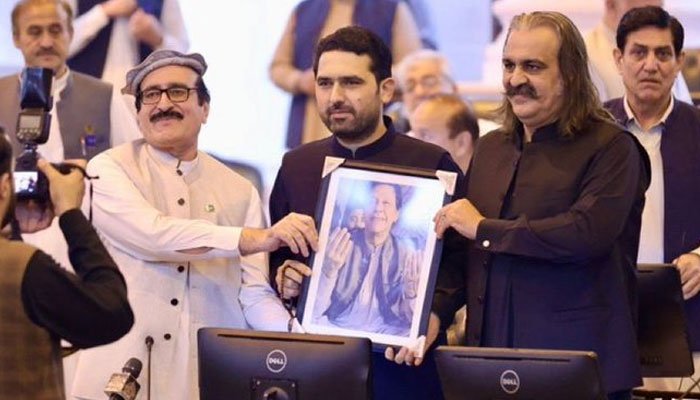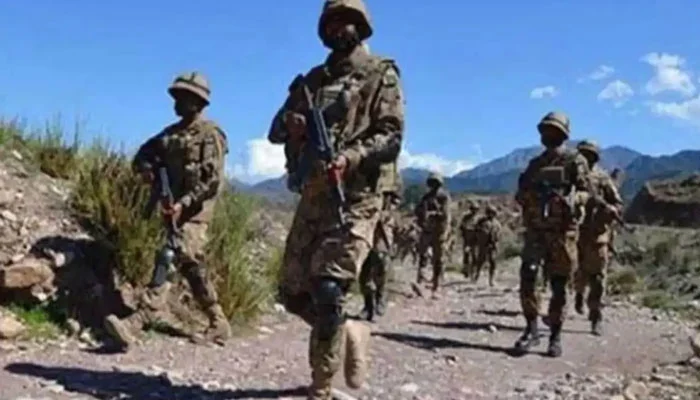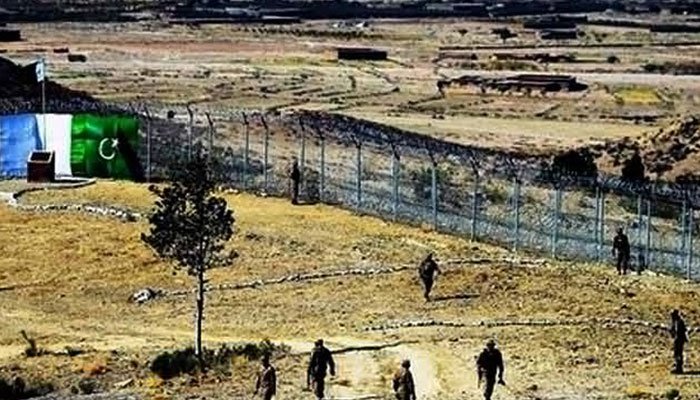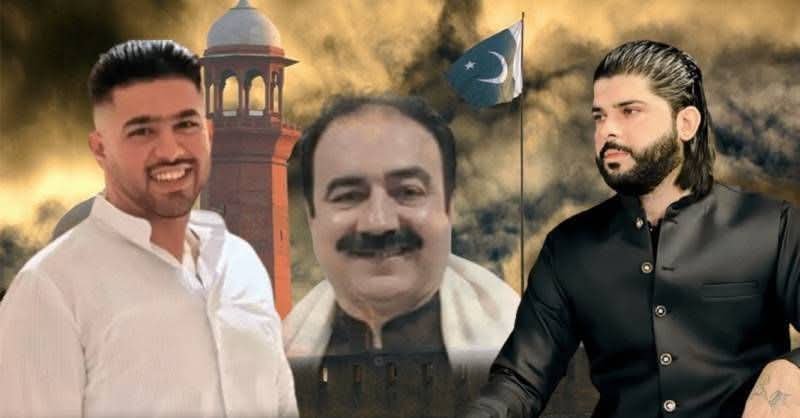CJP Umar Ata Bandial asks government and PTI to initiate political dialogue for nation’s sake.
Polls delay case: SC reserves verdict, decision to be announced tomorrow. A three-member bench of the Supreme Court, headed by Chief Justice of Pakistan Umar Ata Bandial, Monday reserved the verdict on Pakistan Tehreek-e-Insaf’s (PTI) plea against the Election Commission of Pakistan’s (ECP) decision to delay the polls in Punjab and Khyber Pakhtunkhwa.
CJP Bandial stated the court will issue its verdict tomorrow and will announce time later.
Apart from the CJP, the bench includes Justice Munib Akhtar and Justice Ijaz ul Ahsan.
Addressing the Attorney General of Pakistan Mansoor Usman Awan while reserving the verdict, the CJP said that the government and PTI should find a solution through political dialogue.
“Have a political dialogue for the Pakistani nation’s sake. Reach a political conclusion,” the chief justice said.
Earlier today, the Attorney General for Pakistan (AGP) Mansoor Usman Awan requested the Supreme Court to hold an in-chamber hearing on the security issues that forced the Election Commission of Pakistan (ECP) to defer the elections in Punjab and Khyber Pakhtunkhwa.
The AGP made this request as a three-member bench of the Supreme Court, headed by Chief Justice of Pakistan (CJP) Umar Ata Bandial, resumed the hearing of the suo motu as well as the Pakistan Tehreek-e-Insaf’s (PTI) petition challenging the order of the Election Commission of Pakistan (ECP) for postponing the elections in Punjab and Khyber Pakhtunkhwa to October 8.
The hearing resumed after the federal government urged the top court to form a new bench comprising judges who did not hear Punjab and Khyber Pakhtunkhwa election suo motu notice to oversee the instant matter.
Minutes before the start of the hearing, the government applied to the formation of a new bench through Attorney General for Pakistan (AGP) Mansoor Usman Awan.
In the application, the AGP called on the three-member comprising CJP Umar Ata Bandial, Justice Munib Akhtar and Justice Ijaz Ul Ahsan, not to hear the case.
More From FactFile: Supreme Court bench hearing election delay case dissolved
Today’s hearing
At the outset of the hearing, Pakistan Peoples Party (PPP) lawyer Farooq H Naek came to the rostrum and requested to speak.
However, Chef Justice of Pakistan (CJP) Umar Ata Bandial asked whether they were becoming a party to the case as they had announced a boycott of the proceedings.
At this, Naek told the bench that they have not boycotted the proceedings as of yet.
“Do your consultations and tell us. Tell us in writing that you have not boycotted the hearing,” said the CJP.
The PPP counsel then clarified to the court that his party had objections to the formation of the bench and had not boycotted the proceedings.
The CJP then remarked that in the newspapers it has been reported that the PPP has boycotted as well.
“You have boycotted and came to give arguments. In the [PDM] meeting, no confidence was expressed in the bench,” interjected Justice Munib Akhtar.
On this, Pakistan Muslim League-Nawaz (PML-N) lawyer Akram Sheikh told the court that they are yet to take back the power of attorney and they have objections to the bench hearing the case. He also clarified they have not boycotted the proceedings yet.
“A conference of political parties was held and in the last 48 hours in the national press, it is being stated that a boycott has been announced. If you do not have confidence in us then how can you give arguments,” asked Justice Akhtar.
The CJP then turned towards AGP Mansoor Usman Awan and asked what instructions he had gotten, adding that the government cannot boycott the proceedings.
The AGP responded that the governments operate according to the Constitution and that the Election Commission of Pakistan (ECP) has the power to defer the date for the polls.
However, Justice Ahsan observed how can ECP change the date when the Supreme Court has made a decision.
“Supreme Court’s decision is applicable to everyone including the executive,” said Justice Ahsan.
AGP Awan then went on arguing about the March 1 order of the Supreme Court stating the president was asked to give a date for polls in Punjab and the governor in Khyber Pakhtunkhwa. He added that the KP governor is yet to fix a date for the polls to the provincial assembly.
“The law does not allow anyone to delay elections. Only the court can defer the election date,” responded CJP Bandial. He added that in 1988 as well the court postponed the elections.
“The order that is being referred has already been implemented,” added CJP Bandial. He added that the Supreme Court’s hearing is in the public interest and there is a difference of opinion among judges.
On the other hand, Justice Ahsan stated that the real issue was the ECP order, adding that court directives are bounding.
AGP Awan then went back to the suo motu case stating that in the “first round” a nine-member bench heard the case.
“Details of the two judges’ dissenting note have come forward while the two judges had thrown out the pleas on the first day,” stated AGP Awan.
CJP Bandial then told the AGP that he is yet to find a case in which the chief justice was barred from changing the bench.
The AGP said that the Peshawar case was one but the CJP stated that it was not a judicial order but a minority order.
AGP Awan then repeated that the court order for the March 1 verdict was yet to be issued.
“Are you saying that I did not form a new bench and the original one is still intact?” asked CJP Bandial adding, “Difference of opinion is part and parcel of the apex court’s proceedings; however, consultations are held as well”.
“In our opinion, the majority of the judges have rejected the suo motu notice,” said AGP Awan.
The CJP responded that the AGP was disregarding the decision of a five-member bench that had empowered the top judge to formulate benches.
The AGP stated that reservations regarding Justice Ahsan and Justice Mazahar Naqvi were in front of the court, and repeated that the current suo motu notice had been rejected by the majority of the court.
However, CJP Bandial stated that all judges agreed that the chief justice had the authority to form benches.
“The power exercised by the chief justice is administrative and not judicial. The case was heard on merit,” stated Justice Ahsan.
The AGP responded that Justice Athar Minallah had said that “if the chief justice wishes he can include him on the bench”.
“If the judge has stated that it’s the chief justice’s prerogative to form a bench then the argument is over,” interjected Justice Akhtar. He added that if the logic behind the 4-3 decision was accepted then the matter would go to the nine-member bench.
“The detailed dissent note does not include the point of reconstitution of the bench,” added CJP Bandial.
The AGP then stated that as per the note, the reconstitution of the bench was an administrative measure, arguing that as per the note Justice Ahsan and Justice Naqvi recused themselves from the case.
The CJP then added that after the opinion of two judges a new bench was formed and the hearing was resumed.
At this, AGP Awan stated that as per the opinion of four judges, the suo motu notice was dismissed.
However, CJP Bandial stated that the government’s lawyer had failed to convince them on this point. He also added that Justice Qazi Faez Isa’s order is not clear.
“The order of any bench of the Supreme Court applies to all,” stated AGP Awan.
However, Justice Akhtar observed that if the current case is being talked about then no such thing is applicable in this case.
“What you are saying is based on assumptions. Suo motu notice is taken on very important matters,” stated CJP Bandial.





